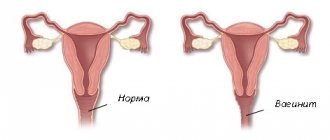During pregnancy, many hormonal changes occur in the body of the expectant mother. Most often, women are worried about a large amount of discharge; they worry whether this is normal and whether there is a threat to the baby’s life. In fact, heavy discharge increases in almost all pregnant women. After all, during the period the walls of the uterus soften, the vaginal microflora changes, a large amount of lubricant is formed, which during childbirth helps the baby move through the birth canal.
The color and consistency of the discharge will tell you about the normal development of the fetus. If they are whitish, without an unpleasant odor and liquid, do not be upset: everything is fine. If you still feel uneasy, contact your gynecologist and get a pap smear. You should be alerted to a change in the color of the discharge, the appearance of itching, or a strong odor. This may indicate uterine pathology and genital tract infection.
When is discharge normal during pregnancy?
In ordinary life, the female body cannot do without secretions. Their most important function is protective: they serve as a kind of barrier to infections and bacteria, representing a transparent, slightly dense mucus, without much odor. Sometimes it may have a slightly yellow or whitish tint. These secretions in women are formed as a result of the work of mucous secretions. With the onset of pregnancy, hormonal changes begin; every day the female hormones progesterone become less and less, and estrogens become more and more, and they help stimulate the functioning of this secretion. Accordingly, the amount of mucous secretions increases.
Thus, transparent discharge in an interesting position is the norm. If the mucus has a brown or clearly white tint, contains lumps or has a heterogeneous consistency, an unpleasant odor or is accompanied by painful sensations, then this indicates a pathology or a certain disease.
Find out in one of our articles what this or that smell of discharge during pregnancy may indicate.
Thick discharge with pieces With white clots
Curdled
Like cottage cheese
Smell of sour milk or yeast
This unpleasant “aroma” indicates thrush, an infection caused by the proliferation of the yeast-like fungus Candida.
In this case, the discharge becomes similar to sour milk, and a coating in the form of white gruel or flakes similar to cottage cheese forms on the genitals. These symptoms, along with the characteristic odor, gave the disease its name.
Candidiasis can spread beyond the genital tract, moving to the anus and groin, where a whitish coating with a characteristic sour milky smell also forms. Fungi can grow in the mouth and under the breasts.
The cause of candidiasis is a disruption of the natural microbial balance that occurs when taking antibiotics, douching and other influences that destroy healthy microflora. Thrush often develops against a background of reduced immunity.
A common cause of candidiasis is diabetes. In this case, in the mucous membrane of the genital tract, the concentration of carbohydrate compounds on which the yeast feeds increases.
Causes of discharge with odor
Causes of curdled discharge during pregnancy
White curdled discharge during pregnancy can occur as a result of several reasons:
- hormonal changes;
- infection with infectious diseases;
- development of vaginal bacteriosis;
- development of candidiasis (thrush);
- consequence of taking hormonal contraceptives and stopping their use.
Often, curd discharge during pregnancy occurs because the body spends all its energy on the normal development and preservation of the fetus, while the protective and barrier function of the mucous membrane of the reproductive system is reduced, allowing the development of some fungal and infectious diseases.
Discharge from thrush in pregnant women can be identified by its cheesy consistency, white, yellow or green tint, sour unpleasant odor, discomfort such as itching, burning, swelling of the mucous membranes.
If white, cheesy, odorless mucus is released, then most likely we are talking about bacterial vaginosis. Its presence can only be determined using a smear.
This disease has no specific symptoms and may not manifest itself for a long time, even going unnoticed. Such discharge during pregnancy can cause complications, intrauterine infection, lead to miscarriage and even complicate the birth process. Therefore, it is very important to immediately consult a doctor when identifying this type of discharge, take a smear test and take the necessary measures.
The same consequences are possible when infected with sexually transmitted infections, which can only be diagnosed by testing and examination by specialists.
Diagnosis of the causes of discharge with an unpleasant odor
To identify the causes of this condition, a gynecological examination is performed. During it, tumor or inflammatory processes are detected on the cervix or in the genital tract. A colposcopy is performed - an examination of the cervix using the optical instrument of a colposcope. The gynecologist takes a smear of the cervix to look for cancerous and precancerous cells.
If uterine tumors are suspected, hysteroscopy is prescribed - examination of the uterine cavity using a hysteroscope. During this diagnosis, the doctor takes tissue samples for biopsy from suspicious areas.
The woman is prescribed a test showing which microorganisms caused the inflammatory process. The best option is the Femoflor study, which identifies almost all pathogens that can cause an unpleasant odor.
Tests for syphilis are ordered - syphilitic sores can also cause a foul-smelling discharge. A woman donates blood for HIV, since the rapid proliferation of pathogenic flora can be caused by suppressed immunity.
A pelvic ultrasound is performed, during which the doctor examines the reproductive organs and bladder to make sure there is no infectious or tumor process.
When caught by surprise by thrush
A disease such as thrush (scientifically candidiasis or candidiasis) deserves special attention. Its causative agents are yeast-like mycoses of the Candida family. They are present in the natural biocenosis of the vagina, i.e. live in the body in small quantities in everyday life. However, due to a number of reasons, their number increases, they multiply excessively, as a result of which thrush develops during pregnancy.
The main cause of candidiasis is a decrease in protective functions and a weakening of the body's immunity during the period of waiting for the baby. These fungi, which live in the microflora of the vagina, receive “reinforcement” from the outside in the form of bacteria and microbes, gaining momentum and affecting ever larger areas of the mucous membrane.
Discharge from thrush in pregnant women has a cheesy consistency with white lumps, an unpleasant sour-milk odor, and may have whitish streaks, a yellowish or greenish tint.
For thrush Curdled
In addition to discharge in the genital area, there is itching and burning, which make themselves felt especially in the evening. In addition, swelling of the mucous membrane and pain in this area may be observed. Sometimes pain when urinating is also typical, since urine, getting on damaged areas of the mucous membrane, injures and irritates them, which causes painful and uncomfortable sensations.
Most often, for this reason, discharge occurs during early pregnancy, as the body goes through an adaptation phase, adapting to the changes that are taking place.
The initial stage of candidiasis does not pose a great threat to the fetus, but if cheesy discharge is detected in the early stages of pregnancy, you should immediately contact a specialist for diagnosis and competent treatment.
Treatment of thrush does not require special costs or effort. As a rule, this disease is eliminated locally using suppositories or douching. Hence the conclusion: if thrush starts, the treatment will be more serious - with the help of pills, which are extremely undesirable to take in an interesting situation. And neglected thrush can lead to cracks in the vagina.
Discharge during pregnancy in the later stages, which is cheesy in nature or leucorrhoea, is particularly unfavorable for the health of the woman and the fetus. They significantly affect the vaginal mucosa, which is prepared during the birth process and is particularly vulnerable at the moment.
To avoid the development of thrush in recent weeks, you need to follow all the rules of hygiene, which we will talk about in the next section.
Causes
If we talk about the causes of unpleasant odor during menstruation, they can be divided into two large groups:
- reasons caused by the action of agents of an infectious nature;
- reasons not related to the action of an infectious factor.
The first group is extensive and can be explained by the presence of:
Candidiasis. Pathology occurs due to the action of a fungus of the genus Candida. The place of vital activity and development in this case is the mucous membrane that lines the vagina. Subjectively, patients complain of itching, curd-like discharge from the perineum with a sour odor.
Vaginosis caused by the action of bacterial flora. The normal microflora of the vagina changes. Various anaerobic bacteria join it. Their vital activity is associated with the appearance of watery secretions that have a specific odor. It is quite unpleasant and resembles the smell of rotten fish.
Trichomonas colpitis. The process develops in the vaginal mucosa. Itching and burning occurs in the genitals. A green and foamy discharge appears. This type of discharge is very smelly. They look very unpleasant. They are characterized by a rotten smell. Their peculiarity is that they can literally stink.
Inflammation of the uterine mucosa. This condition is called endometritis. This pathology may be due to the presence of sexually transmitted diseases. Endometritis can often occur after an abortion. In addition to subjective symptoms associated with pain of various types, there may also be bloody discharge that has an odor. The smell after menstruation is almost always present.
Endometrial cancer occurs more often in postmenopausal women. The oncologist should be alerted to the circumstance in which vaginal discharge is observed that has the color of meat slop. Based on this sign, given the woman’s age, uterine cancer can be suspected.
The discharge may be dark and bloody in nature. This occurs in cases where fetal development occurs outside the uterine cavity. At conception, fertilization of the egg occurs. It then passes through the fallopian tube into the uterus. There are situations when the fallopian tubes become obstructed. Such an obstacle may arise due to congenital pathology or an inflammatory process that leads to the formation of adhesions. The place of attachment of the fetus is the fallopian tube. The fetus grows, increases in size, and the fallopian tube, unable to withstand such loads, ruptures. Such conditions are classified as urgent, since they are fraught with the development of peritonitis.
There are cases in which pregnancy is not able to proceed normally. The fetus in the fallopian tube or uterus dies. At the same time, it decomposes, an inflammatory process occurs, which causes foul-smelling discharge.
Prevention and treatment of curdled discharge during pregnancy
To avoid infectious diseases and candidiasis during pregnancy, you should pay special attention to hygiene.
Hygiene
It is necessary to change your underwear as often as possible, especially in the hot season. Change panty liners more often, since during pregnancy the amount of discharge increases over time, and accordingly, the chances of bacteria and germs getting inside are much greater. Take a shower, not hot, 2 times a day (more often in summer is recommended). Use intimate hygiene products that do not contain dyes or fragrances, with natural extracts and labeled “maintains ph balance.” It is important to pay attention to the linen: it should be made of natural materials, spacious and of a standard shape. Avoid synthetics and thongs, at least for this important period for you. Gynecologists point out that it is irregularly shaped underwear, in particular thongs, that carry bacteria and most often become the cause of thrush and other ailments.
Nutrition
It is worth paying attention to nutrition: bad habits, smoking, and drinking alcohol are themselves contraindicated during pregnancy. They are also involved in reducing immunity and often become one of the causes of such female diseases. Fatty, spicy and salty foods should be excluded from the diet. Introduce more dairy products, fresh herbs, vegetables, fruits and berries into the menu. The quality of nutrition directly affects the condition of the female genital organs and their normal functioning.
Psychological condition
Very often, experts say that Candida strikes after stress. Therefore, it is important to protect yourself from external stimuli and maintain internal balance, which is the most important thing during this difficult period of bearing a child.
Drugs
To prevent candidiasis and other diseases, as well as to maintain normal local microflora, you should discuss taking probiotics with your specialist. As a rule, in this situation, probiotic preparations are prescribed in the form of tampons and suppositories.
If this trouble has overtaken the expectant mother, then it is better to get rid of it with the help of local medications: suppositories, creams, ointments, which have a more gentle effect without affecting other organs. In the initial stages, they successfully eliminate curdled discharge and itching. However, it is necessary to know the specifics of using suppositories for discharge during pregnancy. Read about this in our article at the link.
How to eliminate an unpleasant odor?
It is possible and necessary to get rid of unpleasant odor during menstruation. In this case, a visit to a gynecologist will be not only desirable, but also necessary. Critical days may not only be accompanied by the appearance of an odor associated with discharge, but also be associated with various other symptoms. If this is not observed, then the woman should pay more attention to issues of personal hygiene.
- Warm water should be used to cleanse during menstruation. It is advisable not to use any cosmetics. It is advisable to carry out such procedures in the morning and evening. If the bleeding is severe, then this should be done more often. You can use special intimate hygiene products.
- Frequent gasket changes are expected. Even if the pads have good absorbency, they should not be left in place for more than 5 hours. The tampon should be changed every 2-4 hours.
If the unpleasant odor does not disappear, a consultation with a gynecologist (and in some cases a venereologist) is necessary. Specialists will help determine the causes of the odor and develop measures aimed at eliminating them.
The cause of unpleasant odors in intimate places can be infections caused by the activity of various microflora. This can occur during menstruation, before or after menstruation. In such cases, there is no need to delay the diagnosis of such conditions and their treatment. Such conditions can harm not only the woman herself, but also her partner. Consultation with a specialist, correct and timely treatment will help solve the problem.
The occurrence of an unpleasant odor from the vagina indicates a disruption of the normal composition of the microflora and the development of a pathological process. This condition requires immediate medical attention, examination and treatment.
Women's comments and expert opinions
As practice shows, 88% of our compatriots have encountered the problem of cheesy discharge in everyday life at least once in their lives, 27% of them during pregnancy. Most often these are the consequences of a disease such as candidiasis. Less commonly, this is a consequence of vaginal bacteriosis or an STD. Whatever the reason, the consequences are extremely dangerous for the course of pregnancy if it is not eradicated in time.
It is worth paying attention to the reviews and opinions of expectant mothers and specialists in order to have a clearer idea of this phenomenon.
Normal discharge
Alina, 23 years old: “At first I noticed whitish discharge at the beginning of pregnancy. Every day they became more and more abundant. I was not tormented by pain, there was no itching. I just always believed that during pregnancy the mucus should remain transparent. What could it be: thrush, infection? Or is there no reason to worry at all?” Andrey Markovich, obstetrician-gynecologist: “In the early stages, leucorrhoea is a fairly common phenomenon. If such discharge has a uniform, homogeneous consistency, does not have lumps or an unpleasant odor, and is not accompanied by discomfort in the form of itching, burning, or pain when urinating, then this is an acceptable norm. The increase in mucus secretion is caused by the hormonal rollercoasters inherent in pregnancy, especially in the first trimester. During the first months, the body is dominated by a female hormone such as progesterone, which over time loses ground in favor of estrogens, which stimulate the work of mucous glands and secretions. In this regard, the number of discharges is increasing.”
Pathological discharge
Olga, 32 years old: “During my second pregnancy, at the 6th week, I began to notice unpleasant, pronounced cheesy lumps in my greenish mucus.
At the same time, I felt terrible discomfort and nagging pain in the lower abdomen. I tried to find similar phenomena in photos on the Internet, and everyone unanimously spoke of the presence of an infection. I didn’t delay with the problem, I told the doctor everything right away, and after another diagnosis and collection of all kinds of tests and smears, they established the initial stage of the ill-fated STD (I won’t specify which one). I regret that I didn’t register earlier and didn’t pass all the tests. Thank God, we managed to implement the treatment in time and did not harm the unborn child.” Ivanna Aleksandrovna, obstetrician-gynecologist: “Curdy discharge at any stage means the presence of a fungus, infection or bacterial disease. At the first symptoms, the patient should inform her leading doctor. Don’t try to find similar symptoms in photos on the Internet, don’t diagnose yourself, reassuring yourself that brown discharge during pregnancy is really dangerous, but white and cheesy discharge is not so much. Even if it is a cheesy, odorless discharge, we can talk about vaginal bacteriosis. Any deviation from the norm is not the norm. Think first of all about the health of your unborn baby. At any stage of an interesting situation, such symptoms can pose a threat to both the fetus and you. Modern medicine and pharmaceuticals make it possible to quickly eliminate these troubles without threatening health, pregnancy or special costs. You may be lucky and treatment will be limited to a few baths and rinses with special infusions. However, each organism is individual, and only diagnostics and a specialist can determine the problem. Keep track of all the changes that happen to you while you are expecting a baby and be healthy!
Pathological discharge
In this case, the specified smell is a symptom of thrush. Candida is an opportunistic microorganism that lives in different parts of the body of most people. When acidity increases and immunity decreases, fungi begin to multiply. In the process of life in a woman’s vagina, they corrode areas of the mucous membrane. As a result, the tissues become ulcerated, thin, crack, and even atrophy. The glands cannot function normally, which leads to insufficient hydration of the vagina. Dryness is especially noticeable during sex. Dead candida, their waste products and the leukocytes that come to fight them come out in the form of a curd-like white discharge with the smell of sour milk. The consistency is dense and granular or thick and creamy.
Destruction of the vaginal mucosa leads to itching, burning, inflammation in the form of redness and swelling. Candida quickly enters the woman’s urethra, which causes painful urination and frequent urge.










